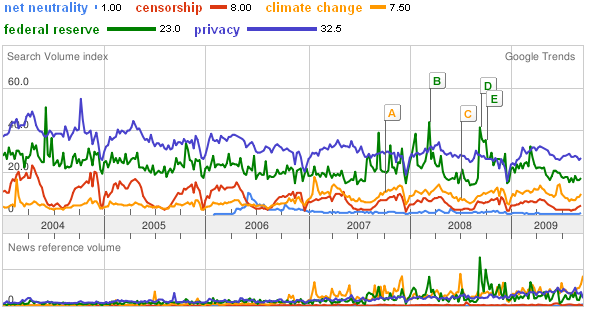FOXNews.com has just published an editorial that I penned about Monday’s net neutrality announcement from the FCC.
by Ryan Radia
The federal government may gain broad new powers to regulate Internet providers next month if Federal Communications Commission Chairman Julius Genachowski gets his way. In a milestone speech on Monday, Genachowski proposed sweeping new regulations that would give the FCC the formal authority to dictate application and network management practices to companies that offer Internet access, including wireless carriers like AT&T and Verizon Wireless.
providers next month if Federal Communications Commission Chairman Julius Genachowski gets his way. In a milestone speech on Monday, Genachowski proposed sweeping new regulations that would give the FCC the formal authority to dictate application and network management practices to companies that offer Internet access, including wireless carriers like AT&T and Verizon Wireless.
Genachowski’s proposed rules would make good on a pledge that President Obama made in his campaign to enshrine net neutrality as law. The announcement was met with cheers by a small but vocal crowd of activists and academics who have been pushing hard for net neutrality for years. But if bureaucrats and politicians truly care about neutrality, they would be wise to resist calls to expand the government’s power over private networks. Instead, policymakers should recognize that it is far more important for government to remain neutral to competing business models — open, closed, or any combination thereof.
Continue reading →
 Washington, D.C. The Space Frontier Foundation today congratulated the Indian Space Research Organization (ISRO) and NASA on their joint discovery of water across the Lunar surface.
Washington, D.C. The Space Frontier Foundation today congratulated the Indian Space Research Organization (ISRO) and NASA on their joint discovery of water across the Lunar surface.
“This discovery marks a turning point for humanity’s future in space,” remarked Foundation Director Berin Szoka. “Just as lumber, coal, and oil found in the New World powered America’s development, the precious resource of Lunar water will enable a truly open frontier in space.”
Scientists had previously assumed the Moon was bone-dry except for small concentrations of ice at the poles, but the Indian probe Chandrayaan-1 has confirmed the presence of water throughout the Lunar surface frozen in Lunar soil where it could easily be harvested.
“If we have water we have the core elements needed to support life,” said SFF Founder Rick Tumlinson. “H2O is a magic formula: We can drink it, raise crops with it, or even break it down for oxygen to breathe. We can even recombine the hydrogen and oxygen to make rocket propellant. Confirming the widespread existence of Moonwater means we have a nearby oasis in space around which we can build true human communities beyond the Earth. There will be flowers on the Moon in our lifetimes.”
Since its creation in 1988, the Foundation has advocated using the resources we find in space to enable human exploration and settlement of the frontier-rather than carrying those resources from the Earth’s surface. These include both asteroid/comet materials and Lunar deposits such as those confirmed in today’s announcement.
“Lunar water will be the ‘mother’s milk’ of permanent human settlement not just of the Moon but of the rest of the Solar System,” concluded Szoka. “Finding water on the Moon is the key to opening the Space Frontier: Once you can refuel in space, you can ‘live off the land’ just like the early settlers who opened frontiers on Earth.”
Over at his always-informative Spectrum Blog, wireless guru Michael Marcus brings to my attention a new report that will definitely be of interest to everyone here about “The Economic Value Generated by Current and Future Allocations of Unlicensed Spectrum.” It was written by Rich Thanki of Perspective Associates, a UK consulting firm. I haven’t had time to finish the whole thing yet, but it basically lays out the argument for opening up more spectrum, especially “white spaces,” to unlicensed use.
Anyway, Mike Marcus has an much better write-up of the report than I could ever do, so head over there to check out his discussion. One important thing that Mike stresses is the importance of technical flexibility:
But the key issue here is not the presence or absence of a license, the key issue is deregulation. A major reason why unlicensed networks have been so innovative is that the descendants of the FCC Docket 81-413 rulemaking, e.g. Wi-Fi, Bluetooth, and Zigbee have been in spectrum bands with great technical flexibility… If you overregulate unlicensed systems, they can stagnate just as much as licensed one often do.
I think that is an important insight and essential lesson that we should always keep in mind when it comes to spectrum policy, regardless of whether we talking about licensed or unlicensed spectrum. Although I’ve always been a bit torn about how much spectrum should be allocated on an unlicensed (or “commons”) basis versus auctioned (property rights model), as Marcus suggests, flexibility is crucial in either case. In all the heated catfights over licensed and unlicensed spectrum, that point sometimes gets overlooked.
From the satirical Book Titles if They Were Written Today:
Then: The Wealth of Nations
Now: Invisible Hands: The Mysterious Market Forces That Control Our Lives and How to Profit from Them
Funny how empowering consumers to choose for themselves is “manipulative.” Oh, right, I forgot: people are stupid and/or lazy, so so elites should chose for them!
Those who advocate regulating Internet service providers as common carriers subject to “open access” mandates (a/k/a “Net Neutrality”) want us to believe that their cause is the “Civil Rights” issue of the digital age, with huge popular support and opposed only by self-interested cable companies and their henchmen. In fact, such regulations would actually harm consumers, increase broadband prices, retard the heretofore-explosive growth of bandwidth, and dramatically increase government control over the Internet. Of course, the degree of public interest in a cause doesn’t actually tell us anything about its justice and, fortunately, we live in a democratic oligarchic republic, not a pure democracy. But it’s worth asking whether Americans are really up in arms about the need for “Net Neutrality” regulations. Google Trends suggests not:
 This kind of comparison should dispel once and for all the myth of a popular groundswell for net neutrality regulation—especially since online search volumes heavily over-represent the interests of the digerati, thus over-stating general interest in web-related topics.
This kind of comparison should dispel once and for all the myth of a popular groundswell for net neutrality regulation—especially since online search volumes heavily over-represent the interests of the digerati, thus over-stating general interest in web-related topics.
In fact, “Net Neutrality” regulation is a niche cause trumpeted incessantly by the blogosphere with about the same level of broad popular interest online as “housing rights”—a topic about which most of us probably don’t often fall into conversation (unless we happen to live in Bakuninist Berkeley or the Bolivarian Caliphate of Cambridge, MA, ground-zero of American Chavismo). Continue reading →
Holman Jenkins has a stinging editorial in today’s Wall Street Journal entitled, “Neutering the ‘Net,” which borrows a term that my friend Randy May coined long ago to describe what net neutrality regulation will ultimately accomplish. What I like best about the Jenkins essay was the way he exposed Free Press for their hypocrisy over metering as a possible alternative approach to network management, something I documented in this piece and this piece about their new-found love of Internet price controls. Here’s how Jenkins puts it in his essay today:
The mask really slipped earlier this year when Time Warner Cable began experimenting with usage-based pricing to protect the average broadband customers from the 20% of users who create 80% of the traffic. A lobby called Free Press, the most extreme of the pro-net neutrality interests, went ballistic, calling metered pricing a “price-gouging scheme” and backing a bill in Congress to ban it.
Never mind that Free Press had previously argued just the opposite, saying usage-based pricing was a fairer way to deal with congestion than, say, by selectively slowing down file-sharing sites that gobble up disproportionate broadband capacity. Never mind, too, the irony that the net-neut campaign against the selective slowing of non-urgent traffic has left only differential pricing as a way to bring a modicum of efficiency to network usage.
Indeed. Of course, we should expect nothing less from the neo-Marxist media reformistas as the UnFree Press.
Leviathan Spam
Send the bits with lasers and chips
See the bytes with LED lights
Wireless, optical, bandwidth boom
A flood of info, a global zoom
Now comes Lessig
Now comes Wu
To tell us what we cannot do
The Net, they say,
Is under attack
Stop!
Before we can’t turn back
They know best
These coder kings
So they prohibit a billion things
What is on their list of don’ts?
Most everything we need the most
To make the Web work
We parse and label
We tag the bits to keep the Net stable
The cloud is not magic
It’s routers and switches
It takes a machine to move exadigits
Now Lessig tells us to route is illegal
To manage Net traffic, Wu’s ultimate evil Continue reading →
Continue reading →
Over at TechDirt, Mike Masnick has an interesting post asking “Why Did Apple Approve Spotify?” which builds on an AdAge column asking a similar question: “Did Apple Sacrifice ITunes With Latest Apps?” As the title of that AdAge piece suggests, some folks are wondering if Apple shot itself in the foot by approving Spotify, a music streaming app that some regard as a potential iTunes killer. I don’t really have any comment on the business angle here, rather, I wanted to just comment on Mike’s suggestion that one possible explanation for Apple’s approval of the app is that:
As we noted when the app was approved, Apple appears to be somewhat gunshy, following the FCC inquiry into why it “blocked” Google Voice on the iPhone (and, yes, Apple still insists it didn’t actually block the app, but Google says otherwise). Given the scrutiny, Apple probably realized that it was in for some serious political trouble if it blocked an app like Spotify, which would have received a lot of press attention. Oddly, the AdAge article doesn’t mention this at all.
Indeed, it is odd that AdAge didn’t bother mentioning that fact. But what I find doubly odd here is that nobody is even blinking an eye at the prospect of such political meddling with — or even possible FCC regulation of — Apple, iTunes, or music streaming market in general! Seriously, have we gotten to the point now in our Bold New World of Neutrality Regulation that innovative high-tech companies must live in fear of constant regulatory intervention even when they completely lack any statutory authority to play these games? Moreover, does anyone think that the a bunch of Beltway bureaucrats can micro-manage music and high-tech application markets and give us more options than we have today?
I know the prospect of such meddling makes some academics and regulatory activists groups happy, but I can’t see how this ends well for consumers or high-tech markets more generally. Regardless, for those of you who laugh when we suggest that the slippery slope of regulation is real, consider this case to be Exhibit A. Or perhaps it’s Exhibit B since the Google Voice spat with Apple was already moving the FCC in the direction of becoming a device regulator and applying “handset neutrality” principles that have no basis in law. It’s your anything-goes government at work.
 I’m thrilled to hear that the Economist has just launched a new column about business, innovation and entrepreneurship in honor of Joseph Schumpeter (1883-1950), the brilliant Austrian economist who,
I’m thrilled to hear that the Economist has just launched a new column about business, innovation and entrepreneurship in honor of Joseph Schumpeter (1883-1950), the brilliant Austrian economist who,
argued that innovation is at the heart of economic progress. It gives new businesses a chance to replace old ones, but it also dooms those new businesses to fail unless they can keep on innovating (or find a powerful government patron). In his most famous phrase he likened capitalism to a “perennial gale of creative destruction”.
For Schumpeter the people who kept this gale blowing were entrepreneurs. He was responsible for popularising the word itself, and for identifying the entrepreneur’s central function: of moving resources, however painfully, to areas where they can be used more productively. But he also recognised that big businesses can be as innovative as small ones, and that entrepreneurs can arise from middle management as well as college dorm-rooms.
Schumpeter’s work on the dynamism of high-tech markets (later married with Clayton Christensen‘s concept of “disruptive innovation“) is one of the most persistent themes across cyber-libertarian thinking of all stripes on a wide variety of issues. You can listen to an interview with the new column’s author on the Economist podcast here (MP3). One important point the author makes is that Schumpeter realized that celebrating capitalism did not preclude criticizing individual capitalists when justified and vice versa—something all too often forgotten today.
Those of you who follow debates about online child protection, free speech, and parental empowerment might be interested in attending an event I am hosting Friday morning at 9:00 in the U.S. Capitol on “Next-Generation Parental Controls & Child Safety Efforts.” Our particular focus will be on the gaming sector and the mobile marketplace. The details are below and you can RSVP here to reserve one of the remaining seats.
Title: “Next-Generation Parental Controls & Child Safety Efforts”
When: this Friday, Sept. 25th from 9:00 a.m. to 10:30 a.m.
Where: U.S. Capitol Room H-137
Speakers:
- Steve Crown, Vice President and Deputy General Counsel of Microsoft Corporation’s Entertainment & Devices Division
- Dane Snowden, Vice President of External & State Affairs, CTIA – The Wireless Association
- Stephen Balkam, Chief Executive Officer, Family Online Safety Institute
- Adam Thierer (Moderator), Senior Fellow, The Progress & Freedom Foundation
Description: Exciting new digital technologies and online opportunities are available to all Americans today. Some parents and policymakers, however, continue to express concerns about the availability of objectionable content or unwanted communications online. There is also increasing concern about the accessibility of such content on newer digital devices, including mobile phones and video game platforms. Luckily, a diverse array of new tools and methods are being developed and deployed to address these concerns. At “Next-Generation Parental Controls & Child Safety Efforts,” a congressional seminar hosted by The Progress & Freedom Foundation, a panel of experts will discuss these child safety concerns and outline the diverse array of new tools and resources that are being developed and deployed to address these issues. At the event, Steve Crown, Vice President and Deputy General Counsel of Microsoft Corporation’s Entertainment & Devices Division, will discuss some of the tools and methods Microsoft has developed to help parents deal with these concerns. He and other panelists will discuss how industry and other organizations are taking steps to empower families with new tools to deal with new Digital Era challenges.
 providers next month if Federal Communications Commission Chairman Julius Genachowski gets his way. In a milestone speech on Monday, Genachowski proposed sweeping new regulations that would give the FCC the formal authority to dictate application and network management practices to companies that offer Internet access, including wireless carriers like AT&T and Verizon Wireless.
providers next month if Federal Communications Commission Chairman Julius Genachowski gets his way. In a milestone speech on Monday, Genachowski proposed sweeping new regulations that would give the FCC the formal authority to dictate application and network management practices to companies that offer Internet access, including wireless carriers like AT&T and Verizon Wireless.




 The Technology Liberation Front is the tech policy blog dedicated to keeping politicians' hands off the 'net and everything else related to technology.
The Technology Liberation Front is the tech policy blog dedicated to keeping politicians' hands off the 'net and everything else related to technology.